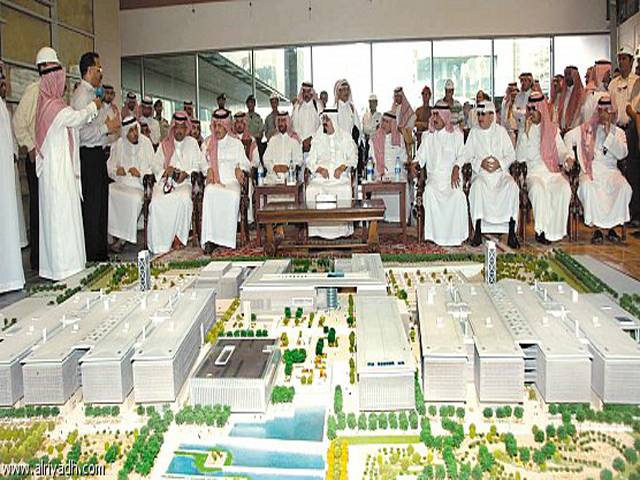King Abdullah University of Science and Technology (KAUST) is a public university located in Thuwal, Saudi Arabia. KAUST was founded in 2009 and focuses exclusively on graduate education and research, using English as the official language of instruction. It offers programs in life Sciences, engineering, computer Sciences, and physical sciences.
History
KAUST officially opened on September 23, 2009, in Thuwal, Saudi Arabia. King Abdullah Bin Abdulaziz Al Saud invited more than 3,000 distinguished Saudis and international guests, including heads of state and Nobel laureates, to join him for the KAUST Inauguration Ceremony on Saudi National Day. During the inauguration, HRH King Abdullah awarded the three senior management staff the highest rank of King Abdulaziz's medal of honor and appreciation, the minister of petroleum getting the platinum and then Khalid AlFalih and Waleed AlBedaiwi getting the gold. Although Saudi authorities did not mention the financial side of the honor, it is widely known that the king awarded them a great cash bonus and many valuable gifts, as this is the tradition in Saudi Arabia. Furthermore, the university launched an inauguration website to allow people from around the world to participate in the event. This website featured a live event webcast, and information about the university's research agenda, lab facilities, faculty, students, and community.
Campus
KAUST’s core campus, located on the Red Sea at Thuwal, is sited on more than 36 square kilometres (14 sq mi), encompassing a marine sanctuary and research facility. There are many hubs of community activity, including Discovery Square, multiple gym facilities, libraries, and many coffee shops. Discovery Square features a modern movie theater, a grocery store, and several restaurants (offering traditional Middle Eastern food, American fast food, and Pakistani/Indian food). The gym facilities include exercise equipment, free weights, racquet sports, bowling, and rock climbing, among other things. The campus is still under development in early 2011, with new stores and restaurants opening periodically.
KAUST is Saudi Arabia's first and the world's largest LEED (Leadership in Energy and Environmental Design)-certified project, while LEED is an internationally recognized green building certification system, providing third-party verification that a building or community was designed and built using strategies intended to improve performance in metrics such as energy savings, water efficiency, CO2 emissions reduction, improved indoor environmental quality, and stewardship of resources and sensitivity to their impacts. Furthermore, KAUST was also chosen by the American Institute of Architects (AIA) Committee on the Environment (COTE) as one of the 2010 Top Ten Green Projects.
Laboratories
Cutting-edge laboratories will enable researchers to make major scientific breakthroughs at KAUST. Other research institutions in the Kingdom and the region will link to the university’s supercomputer and other laboratory facilities through the 10 gigabits per second (Gbps) Saudi Arabian Advanced Research and Education Network (SAREN).
Supercomputer: Shaheen—the Arabic word for peregrine falcon—is the fastest supercomputer in the Middle East and one of the most powerful in the world. Developed by IBM, it is capable of 222 teraflops, or 222 trillion floating point operations per second. ■Visualization: CORNEA is a fully immersive, six-sided virtual reality facility that gives students and researchers the ability to turn data into 3D structures that they can interact with and examine. It was built in partnership with the University of California, San Diego.
Nanofabrication, Imaging, and Characterization: A clean-room environment equipped with leading-edge tools to support research in advanced materials, biotechnology, electronics and photonics, and MEMS/NEMS. The Imaging and Characterization Labs include a suite of 10 advanced nuclear magnetic resonance (NMR) spectrometers and facilities for scanning, transmission, confocal, and Raman microscopy, magnetic and thermal measurements, allowing scientists to examine nanostructure devices and surfaces down to the level of individual atoms. Coastal and Marine Resources: Located next to the Red Sea, the Coastal and Marine Resources Lab facilitates marine research. The facility builds and deploys modern oceanographic instrumentation and provides operational services to support research vessels for marine exploration, diving, and sampling. Indoor and outdoor seawater facilities allow researchers to culture marine organisms.
Analytical Core: These labs boast highly skilled staff focusing on spectroscopy, chromatography and mass spectrometry, trace metals analysis, wet chemistry, and surface analysis.
Biosciences and Bioengineering: These facilities include genomic and proteomic labs essential to the study of cellular molecules for DNA sequencing and genetic analysis, as well as the investigation of cellular processes. The genomics facility is equipped with robots and laboratory automation.
Academics and Research
KAUST organizes interdisciplinary collaborative research teams of faculty and students, without regard to disciplinary boundaries, across three academic divisions: (1) Chemical and Life Sciences and Engineering; (2) Mathematical and Computer Sciences and Engineering; and (3) Physical Sciences and Engineering. KAUST offers two graduate programs in the various fields: a Master of Science degree (18 months) and a Ph.D. program (3-4 years involving original research that culminates in a dissertation.
Degrees are offered in 11 fields of study
Applied Mathematics and Computational Science (AMCS)
Bioscience (B)
Chemical and Biological Engineering (CBE)
Chemical Science (ChemS)
Computer Science (CS)
Earth Science and Engineering (ErSE)
Electrical Engineering (EE)
Environmental Science and Engineering (EnSE)
Marine Science (MarSE)
Materials Science and Engineering (MSE)
Mechanical Engineering (ME)
KAUST focuses on research that applies science and technology to problems of human need, social advancement, and economic development. Four strategic research thrusts build KAUST’s research agenda: Resources, Energy and Environment; Biosciences and Bioengineering; Materials Science and Engineering; Applied Mathematics and Computational Science. To support these thrusts, KAUST established multidisciplinary Research Centers focused on catalysis, clean combustion, computational bioscience, geometric modeling and scientific visualization, membranes, plant stress genomics and technology, Red Sea science and engineering, solar and alternative energy science and engineering, and water desalination and reuse.
Students
KAUST currently has between 650 and 700 students. The majority of these students are enrolled in Masters programs, but the PhD student population is growing steadily as of 2011. The student population comes from over 60 different nationalities from all continents. The largest single national representation is from China with Mexico in second place.






